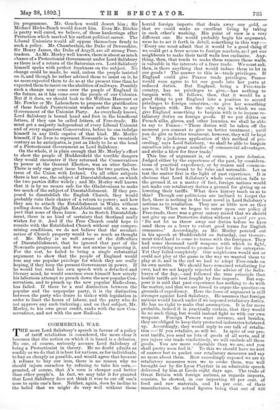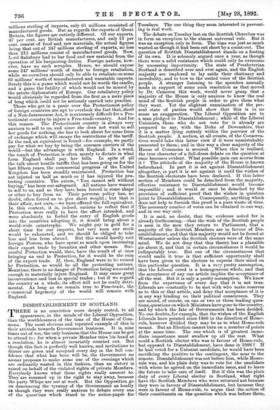COMMERCIAL WAR. T HE more Lord Salisbury's speech in favour of
a policy of tariff retaliation is considered, the more clear it becomes that the notion on which it is based is a delusion. No one, of course, seriously accuses Lord Salisbury of being a Protectionist in theory. He no doubt admits as readily as we do that it is best for nations, as for individuals, to buy as cheaply as possible, and would agree that because A refuses to buy our iron, there is no reason why we should injure ourselves by refusing to take his corn,— granted, of course, that A's corn is cheaper and better than other people's. In fact, we may take it for granted that Lord Salisbury does not think it wise to cut off one's nose to spite one's face. Neither, again, does he incline to the belief that we might do very well without those horrid foreign imports that drain away our gold, or that we could make an excellent living by taking in each other's washing. His point of view is a very different one. He would probably begin his argument, were he to set it forth in detail, something in this way :- 'Every Every one must admit that it would be a good thing if we could get a freer access to foreign markets, ard get our neighbours to make their tariff walls less exclusive. Any- thing, then, that tends to make them remove those walls, is valuable in the interests of a freer trade. We must ask, then, is there anything that would induce them to let in our goods ? The answer to this is—trade privileges. If England could give France trade privileges, France would soon agree to let our goods into her ports at reduced duties. But England, being a Free-trade country, has no privileges to give,—has nothing to bargain with. It follows, then, that it would be a good thing to put England into a position to accord privileges to foreign countries,—to give her something to bargain with. But the only way in which we can give England something to bargain with is to impose re- taliatory duties on foreign goods. If we put duties on French silks, gloves, and other luxuries, we shall be able to say to France : "These duties will be taken off the moment you consent to give us better treatment ; until you do give us better treatment, however, they will be kept on." By a judicious application of this method of pro- ceeding,' says Lord Salisbury, we shall be able to bargain ourselves into a great number of commercial advantages, and strike a blow for freer trade.'
This line of argument is, of course, a pure delusion. Judged either by the experience of the past, by considera- tions of practical expediency, or by reason and common- sense, it will be found to be false and untenable. Let us test the matter first in the light of past experience. It is obvious that Lord Salisbury's whole contention falls to the ground if, as a matter of fact, foreign nations would not make our retaliatory duties a ground for giving up or lowering their tariffs. What does history teach us as to this? Though our politicians are inclined to forget the fact, there is nothing in the least novel in Lord Salisbury's notions as to retaliation. They are as little new as they are true. When we began to enter upon our policy of Free-trade, there was a great outcry raised that we should not give up our Protective duties without a quid pro quo. Do not let us throw away our duties before we have used them as a lever to extort good terms for English commerce.' Accordingly, as Mr. Morley pointed out in his speech at -Huddersfield on Saturday, our Goverr- ment tried hard to come to terms with the foreigner. They had some thousand tariff weapons with which to fight, and everything seemed to promise fair for the enterprise. Yet they failed completely. Our neighbours would not or could not play at the game in the way we wanted them to play at it, and in the end we had to adopt Free-trade on its own merits. We should have remained retaliating for ever, had we not happily rejected the advice of the Salle- burys of the day,—and followed the true principle that hostile tariffs are best fought by free imports. But sup- pose it is said that past experience has nothing to do with the matter, and that we are forced to argue the question on grounds of expediency. Here the force of argument is still stronger against Lord Salisbury. He assumes that foreign nations would knock under if we imposed retaliatory duties. He has no right to make that assumption. It is far more probable, indeed it is practically certain, that they would• do no such thing, but would instead fight us with our own weapons. Foreign Powers want revenue, and besides, they are obliged to keep their protected industries bolstered up. Accordingly, they would reply to our talk of retalia- tion If you retaliate, so will we. In spite of our pre- sent tariffs, you send us lots of goods of all sorts, and if you injure our trade vindictively, we will exclude all these goods. You are more vulnerable than we are, and you shall pretty soon feel it.' To this we should have no sort of answer but to pocket our retaliatory measures and say no more about them. How exceedingly exposed we are to retaliatory measures were we to evoke them, was well brought out by Sir Lyon Playfair in an admirable speech delivered by him at Leeds eight days ago. The trade of Great Britain with foreign nations, as regards imports, consists, he showed, in our importing 86 per cent, of food and raw materials, and 14 per cent, of their manufactures, the actual figures being that out of 436 millions sterling of imports, only 65 millions consisted of manufactured goods. But as regards the exports of Great Britain, the figures are entirely different. Of our exports, 87 per cent. are British manufactures, and only 13 per cent. consist of food and raw materials, the actual figures being that out of 247 millions sterling of exports, no less than 215 millions consist of manufactured goods. Now, Lord Salisbury had to bar food and raw material from the operation of his bargaining duties. Foreign nations, how- ever, have no such scruples. Hence, we should expose some 247 millions' worth of trade to foreign retaliation, while we ourselves should only be able to retaliate on some 65 millions' worth of manufactured and uneatable imports. Surely this is a game which would not be worth the candle, and a game the futility of which would not be missed by the astute diplomatists of Europe. Our retaliatory policy would obviously be regarded from the first as a mere piece of brag which could not be seriously carried into practice. Those who get in a panic over the Protectionist policy of foreign countries are apt to overlook the fact that, short of a Non-Intercourse Act, it is extremely difficult for a Pro- tectionist country to injure a Free-trade country. And for this reason. The Protectionist country is always very anxious to sell to us, and since she does not want to sell her goods for nothing, she has to look about for some form of exchange which will escape the restrictions of the tariff. In the end, an equivalent is found—for example, we partly pay for what we buy by being the common carriers of the world—but the advantage is with England. In a word, the result of Protection is often merely to dictate in what form England shall pay her bills. In spite of all the talk about hostile tariffs that has been going on for the last fifteen years, the commercial progress of the United Kingdom has been steadily maintained. Protection has not injured us half as much as it has injured the pro- tecting countries. The axiom, "You cannot sell without buying," has been our safeguard. All nations have wanted to sell to us, and so they have been forced in some shape or other to buy from us. Their perverse policy has, no doubt, often forced us to give short weight ; but that is their affair, not ours,—we have offered the full equivalent. In this context, it is, indeed, curious to reflect that if Protection were really to have the effect intended, and were absolutely to forbid the entry of English goods into the countries adopting it, it would bring about a world-wide catastrophe. We might pay in gold for a short time for our imports, but very soon our stock would be exhausted, and we should be obliged to take less and less from abroad. But this would hardly suit foreign Powers, who have spent so much upon increasing their export trade by bounties and other means. Suc- cessful Protection would, then, have the result of at once bringing an end to Protection, for it would be the ruin of the export trade. If, then, England were to be ruined by Protection, so would be all the protecting nations. Meantime, there is no danger of Protection being successful enough to materially injure England. It may cause great inconvenience and loss in special trades ; but if we regard the country as a whole, its effect will not be really detri- mental. As long as we remain true to Free-trade, the e )mmercial hegemony of the world will remain with England.







































 Previous page
Previous page